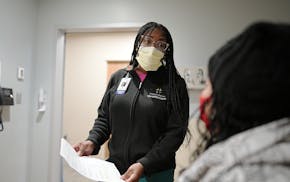The first community solar garden on the Near North Side of Minneapolis will rise this spring on a flat-roofed church along W. Broadway Avenue, thanks to an emerging coalition of faith partners, clean-energy advocates, industry experts, job trainers and community members.
"The 'Just Solar Garden' at Shiloh Temple underscores the need for solar energy equality and equal-employment opportunities in communities of color, like the North Side of Minneapolis," said Julia Nerbonne, executive director of Minnesota Interfaith Power & Light (MNIPL). "This project [and a related March 10 conference] will demonstrate how access to clean energy, workforce development and public policy solutions can bring about authentic equity in the quickly developing solar arena."
The Just Solar Garden project atop Shiloh Temple is being driven by the MNIPL coalition and its technical and job-training partners.
The Just Solar Coalition also plans installations this year in Edina, at Pax Christi Catholic Church in Eden Prairie and a downtown city parking ramp, as well as in rural Minnesota.
The $500,000 Shiloh project, to be formally announced Friday, is the first of several faith-based solar installations and will precede a Saturday conference at Metro State University's Great Hall in St. Paul on building a "Just Solar" model that spreads clean energy and jobs into diverse and low-income communities. That will feature Jacqui Patterson, director of the NAACP Environmental and Climate Justice Program in Washington, D.C.
The Shiloh solar array will host 630 panels, and generate enough juice to power the neighboring Masjid An-Nur mosque and 26 households. It is a small, but significant, start and brings Near North — with its historic concentration of minority residents, low-income households and high unemployment rates — into the local solar surge.
Marcus Owens, a North Side native and business veteran who is CEO of the Northside Economic Opportunity Network, said the solar garden is "a fantastic opportunity for the community; particularly opening pathways for job creation; building technological and economical environmental infrastructure."
A West Broadway surge
The North Side also has experienced rising property values amid increased housing demand in recent years. And there's been a modest surge in new apartment buildings along the West Broadway corridor that is the main commercial artery of north Minneapolis, as well as small business expansion in refurbished buildings that center on health, art, apparel and food. Other recent developments include construction of a $36 million project to build a headquarters for Thor Cos., along with office space that will include nonprofit minority business counselor and lender Meda, and other related developments at the nearby intersection of Penn and Plymouth avenues.
Three popular microbreweries have sprouted in the neighborhood that commercial real estate analysts say is a sign of rejuvenation in once-dilapidated industrial buildings.
Solar and wind energy jobs are among the fastest-growing employment categories in Minnesota. A number of churches, schools and commercial buildings already feature solar arrays in south Minneapolis and elsewhere in the Twin Cities. And MNIPL also is working to cut more minorities into such work through training partners.
Minnesota posted the second highest solar-energy job growth in the country last year, 48 percent, to 4,256 jobs, according to the Solar Foundation. There are more than 250,271 U.S. solar jobs, the majority in installation.
That compares to under 75,000 coal industry jobs. And renewable sources, including wind and solar, have surpassed nuclear power as the second-largest generator of electricity in Minnesota.
Minnesota's soaring solar employment stems somewhat from the state-mandated Community Solar Garden program, created in 2013. There were 58 community solar projects in December, compared to 10 a year earlier. So far, they can generate at peak up to 211 megawatts compared to 400 megawatts for a midsize coal plant.
Xcel Energy administers the solar garden program, which is aimed at residents, businesses and governments that want solar energy without setting up their own rooftop arrays. Instead, they subscribe to larger arrays operated by independent companies and organizations that connect to Xcel's grid. Most have been built outside the Twin Cities.
Timothy DenHerder-Thomas of Cooperative Energy Futures of Minneapolis, the developer of the Shiloh project, said it will be financed 40 percent by a local equity investor, which will benefit from federal tax credits, 40 percent from bank debt and 20 percent by subscribing community members.
"There's a lot of other inner-city stuff in the hopper," Nerbonne said.
Ralph Jacobsen, founder of IPS Solar, Minnesota's oldest solar installer, said his firm is working with Jamez Staples, a North Sider and CEO of Renewable Energy Partners, to train minority workers for this and future solar projects.
"This is a job our crew has really been looking forward to," Jacobson said.
Neal St. Anthony has been a Star Tribune business columnist and reporter since 1984. He can be contacted at nstanthony@startribune.com.

St. Anthony: 'Patient' investing paying off for St. Paul's Hill Capital

Jennifer Smith, leader of Burnsville's Innovative Office Solutions, has died

St. Anthony: Medical professions in Minnesota need more people of color in their ranks



